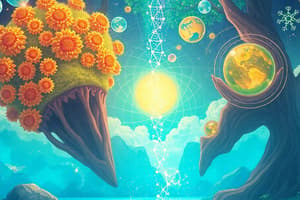Podcast
Questions and Answers
What is the primary aim of science?
What is the primary aim of science?
- To explain natural phenomena (correct)
- To accumulate vast amounts of data
- To entertain through experimentation
- To create technological gadgets
Which branch of science primarily studies living organisms?
Which branch of science primarily studies living organisms?
- Chemistry
- Computer Science
- Biology (correct)
- Physics
What does the scientific method start with?
What does the scientific method start with?
- Data Analysis
- Conclusion
- Observation (correct)
- Experimentation
Which of the following best describes a hypothesis?
Which of the following best describes a hypothesis?
What is an example of applied science?
What is an example of applied science?
What does peer review involve?
What does peer review involve?
What is a law in scientific terms?
What is a law in scientific terms?
Which of these fields is classified under formal sciences?
Which of these fields is classified under formal sciences?
Which of the following statements is true about science's importance?
Which of the following statements is true about science's importance?
What defines natural sciences?
What defines natural sciences?
Study Notes
Definition of Science
- Systematic study of the natural world through observation and experimentation.
- Aims to explain natural phenomena and develop theoretical models.
Branches of Science
-
Natural Sciences
- Physics: Study of matter, energy, and the fundamental forces of nature.
- Chemistry: Study of substances, their properties, reactions, and transformations.
- Biology: Study of living organisms and their interactions with the environment.
-
Formal Sciences
- Mathematics: Study of numbers, quantities, shapes, and patterns.
- Logic: Study of reasoning principles and arguments.
- Computer Science: Study of algorithms, data structures, and computational processes.
-
Social Sciences
- Psychology: Study of behavior and mental processes.
- Sociology: Study of society, social institutions, and social relationships.
- Economics: Study of the production, distribution, and consumption of goods and services.
-
Applied Sciences
- Practical application of scientific knowledge to solve real-world problems.
- Includes fields like engineering, medicine, and environmental science.
Scientific Method
- Observation: Identifying a phenomenon or problem to study.
- Questioning: Formulating questions based on observations.
- Hypothesis Formation: Proposing explanations that can be tested.
- Experimentation: Conducting experiments to test hypotheses.
- Data Analysis: Analyzing data collected from experiments.
- Conclusion: Drawing conclusions based on data; accepting or refuting hypotheses.
- Communication: Sharing results with the scientific community.
Importance of Science
- Fosters critical thinking and problem-solving skills.
- Drives technological advancement and innovation.
- Contributes to the understanding of health, environment, and society.
- Informs public policy and decision-making through evidence-based research.
Key Concepts
- Theory: A well-substantiated explanation of an aspect of the natural world.
- Law: A statement that describes an observable phenomenon or a set of observations.
- Experiment: A controlled method of testing a hypothesis.
- Peer Review: The process of subjecting scientific work to scrutiny by others in the field before publication.
Definition of Science
- Science is a systematic approach to understanding the natural world through observation and experimentation.
- Aims to explain natural phenomena and build theoretical models.
Branches of Science
- Natural Sciences study the physical world.
- Physics investigates matter, energy, and fundamental forces.
- Chemistry focuses on substances, their properties, reactions, and transformations.
- Biology explores living organisms and their interactions with the environment.
- Formal Sciences deal with abstract systems and reasoning.
- Mathematics explores numbers, quantities, shapes, and patterns.
- Logic studies reasoning principles and arguments.
- Computer Science focuses on algorithms, data structures, and computational processes.
- Social Sciences study human behavior and social interactions.
- Psychology investigates behavior and mental processes.
- Sociology studies society, social institutions, and relationships.
- Economics focuses on production, distribution, and consumption of goods and services.
- Applied Sciences apply scientific knowledge to solve real-world problems.
- Examples include engineering, medicine, and environmental science.
Scientific Method
- A systematic and empirical approach to gaining knowledge.
- Steps include:
- Observation: Identifying a phenomenon or problem to study.
- Questioning: Formulating questions based on observations.
- Hypothesis Formation: Proposing testable explanations.
- Experimentation: Conducting experiments to test hypotheses.
- Data Analysis: Analyzing collected data from experiments.
- Conclusion: Drawing conclusions based on data; accepting or rejecting hypotheses.
- Communication: Sharing findings with the scientific community.
Importance of Science
- Fosters critical thinking and problem-solving skills.
- Drives technological advancement and innovation.
- Contributes to understanding health, environment, and society.
- Informs public policy and decision-making through evidence-based research.
Key Concepts
- Theory: A well-substantiated explanation of an aspect of the natural world.
- Law: A statement describing an observable phenomenon or a set of observations.
- Experiment: A controlled method for testing a hypothesis.
- Peer Review: A process where scientific work is scrutinized by others in the field before publication.
Studying That Suits You
Use AI to generate personalized quizzes and flashcards to suit your learning preferences.
Description
Explore the fundamental definitions of science and its various branches, including natural, formal, and social sciences. This quiz will test your understanding of key concepts in physics, chemistry, biology, mathematics, psychology, and more.




